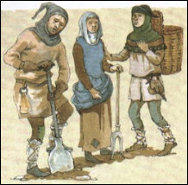


King = Country
Feudal society was a society where all power resided with the king. This power derived from the fact that all things, land, property, people, belonged to the king who distributed that power to those on whom he could rely for support, both in the administration of his kingdom and in response to any internal or external threat to the kingdom or crown. In this society were three classes of people beneath the monarch: Those who fought and those who prayed were “free men”, the rest (90% + of the population) were not “free”.The Elite
The monarch parcelled out land (and all that the land contained, including people) to nobles on whom he could rely for support. In return for the land, the noble would commit to supply the king with a proportion of the produce of the land, money and knights plus other warriors such as pikemen, archers. etc. Should the noble default on any of his commitments, the land could be withdrawn and given to another, more reliable noble, or be retained and administered directly by the king himself. In their turn, the nobles subdivided their land and distributed it to knights who would then swear allegiance to the noble and, through him, to the king. Alongside the nobles, in terms of seniority, were the bishops and cardinals - senior church men.The Workers
Bottom of the hierarchy (other than slaves at the very bottom) were the serfs. Serfs farmed the land and did other work around the estates as required by the lord. A serf rented a cottage and, usually, some land from the lord. Any work required by the lord took precedence over work needed to sustain the serf’s own family. The serf was tied to the land in which he lived. He could not leave without the lord’s permission. If the land went to a new “owner”, the serf’s allegiance moved to the new lord as part of the land.
Norman life
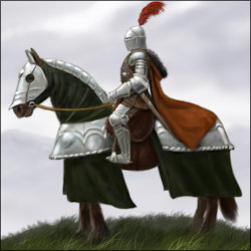
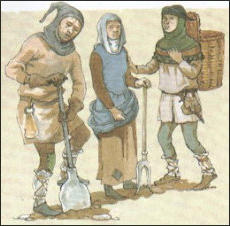




King
Serfs
Clergy
Nobles
Lords
Barons
Knights
etc
Cardinals
Bishops
•
those who fight (the elite)
•
those who pray (alongside the elite)
•
those who work.
© Walter Jardine 2016


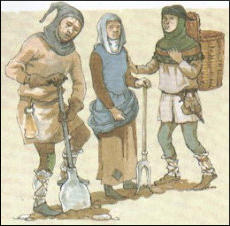
Novel




King = Country
Feudal society was a society where all power resided with the king. This power derived from the fact that all things, land, property, people, belonged to the king who distributed that power to those on whom he could rely for support, both in the administration of his kingdom and in response to any internal or external threat to the kingdom or crown. In this society were three classes of people beneath the monarch: Those who fought and those who prayed were “free men”, the rest (90% + of the population) were not “free”.The Elite
The monarch parcelled out land (and all that the land contained, including people) to nobles on whom he could rely for support. In return for the land, the noble would commit to supply the king with a proportion of the produce of the land, money and knights plus other warriors such as pikemen, archers. etc. Should the noble default on any of his commitments, the land could be withdrawn and given to another, more reliable noble, or be retained and administered directly by the king himself. In their turn, the nobles subdivided their land and distributed it to knights who would then swear allegiance to the noble and, through him, to the king. Alongside the nobles, in terms of seniority, were the bishops and cardinals - senior church men.The Workers
Bottom of the hierarchy (other than slaves at the very bottom) were the serfs. Serfs farmed the land and did other work around the estates as required by the lord. A serf rented a cottage and, usually, some land from the lord. Any work required by the lord took precedence over work needed to sustain the serf’s own family. The serf was tied to the land in which he lived. He could not leave without the lord’s permission. If the land went to a new “owner”, the serf’s allegiance moved to the new lord as part of the land.
Norman life
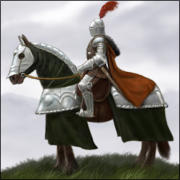




King
Serfs
Clergy
Nobles
Lords
Barons
Knights
etc
Cardinals
Bishops
•
those who fight (the elite)
•
those who pray (alongside the elite)
•
those who work.
